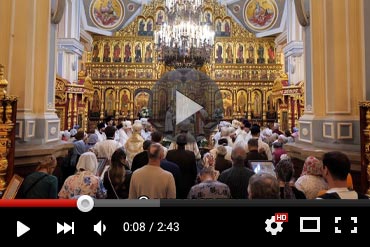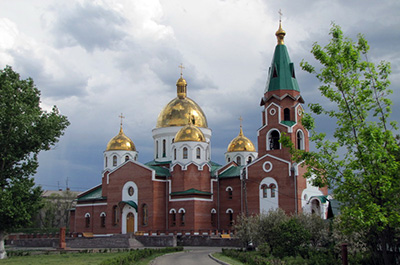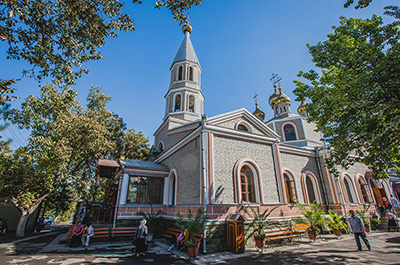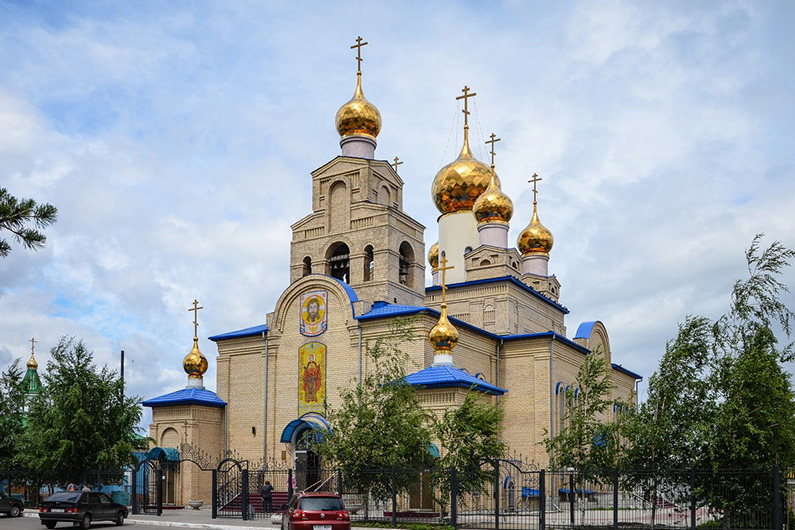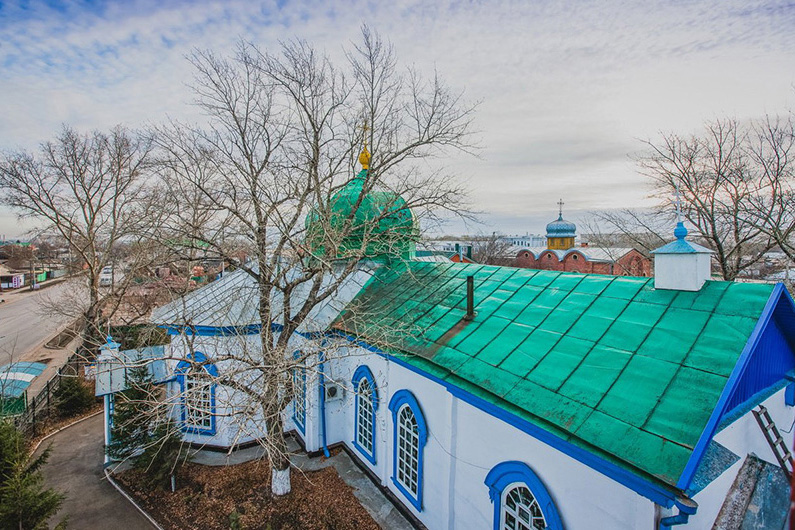
Report of Metropolitan Alexander of Astana and Kazakhstan at the monastic conference in the Southern capital on August 3, 2024
- 03.08.2024, 15:27
- Новости на английском языке

Your Eminences!
Venerable fathers, dear brothers and sisters!
I greet the organizers and participants of the traditional monastic conference of the Kazakhstan Metropolitan District, which is held with the blessing of His Holiness Patriarch Kirill of Moscow and All Rus' after the celebration of the days of memory of outstanding saints - St. Seraphim of Sarov and the Prophet of God Elijah.
Why are such meetings of monastics necessary? The Optina elders strongly advised their disciples to reread the books of the ancient ascetic fathers - Abba Dorotheus, John Climacus, "Philokalia" and other similar works once every three to four years to renew and strengthen their inner spiritual guidelines. Every time he opened the seemingly familiar ascetic literature, the monastery resident found something new for himself. Monastic conferences have a similar goal - to refresh in memory the existing knowledge in the field of prayerful work or the struggle with passions, to explore the rich patristic heritage in order to find in it answers to current questions of monastic life, help in finding for himself and his spiritual children new incentives for diligent obedience and tireless performance of church works.
The topic of the current meeting of Kazakhstani monastics is very relevant - we will discuss with you the issues of replenishing monasteries with new brothers and sisters.
Monasticism is an integral and very significant part of church life. The traditions of the "fasting life" on the territory of modern Kazakhstan date back to 1881, when Bishop Alexander (Kulchitsky) of Turkestan founded the Holy Trinity Monastery on the shores of Lake Issyk-Kul. Among the holy monks who labored on the land of Kazakhstan, we honor the bright luminaries of Orthodoxy - the successor of Optina monasticism, the Venerable Confessor Sebastian of Karaganda, the spiritual disciples of the Glinsk Hermitage - the Venerable Martyrs Hieromonks Seraphim (Bogoslovsky), Feognost (Pivovarov) and Anatoly (Smirnov), the inhabitants of the Issyk-Kul Trinity Monastery - the Venerable Martyr Hieromonk Pakhomiy (Rusin) and the Venerable Confessor Hieromonk Irakli (Matyakh). In the 20th century, the ever-memorable pastors and confessors of the faith, Archimandrite Kirill (Borodin) and Archimandrite Isaac (Vinogradov), worked here.
The revival of monastic life in the country began at the end of the last century, when the Church gained the opportunity to develop freely. In 1993, the first monastery in the modern history of Kazakhstan was opened in Ust-Kamenogorsk - a monastery in honor of the Life-Giving Trinity, in 1994, the Holy Silouan Issyk Hermitage was founded near Alma-Ata, in the same year, the Petropavlovsk Abalatsko-Znamensky Monastery was opened in Semipalatinsk, and the Pokrovskaya Monastery in Uralsk, in 1996, a hermitage was created in the name of the holy martyrs Seraphim and Theognost, on the site of their exploits and martyrdom in the Aksai Gorge, in 1998 - the Petropavlovsk Monastery in Pavlodar, in 2008 - the Iversko-Seraphimovsky Convent in the southern capital. Since 2023, the Iversko-Peter and Paul Convent has been revived in the Kostanay Diocese. In addition to the above, since the middle of the last century there have been two permanent women's monasteries in the country - in honor of the Nativity of the Virgin Mary in Karaganda and in honor of the icon of the Queen of Heaven "Seeking the Lost" in Astana.
Monasticism is the light of the world, the ideal of the evangelical life in Christ. As St. John Climacus says, "the light of monks is angels and the light of laymen is monastic life." Therefore, our monasteries are called to become centers of pilgrimage, catechesis, charitable and active spiritual and educational work. The implementation of this special mission cannot and should not fall on the shoulders of abbots and abbesses alone. This is the common task of the entire monastic brotherhood and sisterhood, regardless of where a person who has dedicated himself to God labors - in a monastery, in a parish or in diocesan departments. The life of a monastic is a constant internal tension, a burning of the heart, it is a ceaseless work of overcoming one’s “selfishness” and self-will, everything that prevents God from creating a dwelling place in the heart of man (John 14:23). It is a constant feat of transforming one’s soul and sacrificial service to the Church of Christ.
All the difficulties and problems of our time inevitably affect the life of monasteries. It is with bitterness that we have to state that due to the ever-increasing negative influence of the world on the consciousness and life of society, people are losing their desire for monastic life, which gives them the opportunity to realize the Gospel ideal and, leaving everything, follow Christ (Matthew 16:24). In many ways, the reasons for this state of affairs are obvious - modern man strives for physical comfort, for the benefits of civilization, and it is already difficult for him to accept ancient ascetic ideals. A true miracle today is the choice of a monastic way of life by a person. In addition, the Orthodox Church of Kazakhstan faces its own specific difficulties in organizing monastic communities, which include remoteness from ancient, traditional centers of monasticism, living in a different religious environment, and the lack of experienced spiritual fathers who would have significant experience of monastic obedience. But despite all the external difficulties, the main problem is rooted within ourselves. When I was the Archbishop of Kostroma and Galich, I had the opportunity to initiate the revival of 11 ancient monastic communities, both male and female. For spiritual advice in this difficult endeavor, the abbots and abbesses and I turned to authoritative elders - Archimandrite Kirill (Pavlov), Archimandrite John (Krestyankin), Archpriest Nikolai Guryanov and others. When I asked them what the main problem of modern church life was, they answered with surprising unanimity - lack of faith. The elders emphasized that this was not only about the laity, but also about pastors and monastics. A Christian destroyed by lack of faith does not even think about monastic life, he runs away from feats, avoids obedience, sees no point in humility, fasting and prayer. Likewise, lack of faith destroys those who have already taken monastic vows to God. This is what the great ascetic of the 7th century, St. Isaac the Syrian, writes about this, telling us that the worst thing that can happen to a monk is: “A heart that does not believe is condemned. You have fallen into despair because of God’s abandonment, born of your unbelief.” The way out of this state is only in sincere, deep repentance, in an honest awareness of one’s weakness and turning to God. Therefore, you and I should make every effort to improve the internal, spiritual situation in monasteries and parishes, to strengthen faith both in ourselves and in our parishioners.
St. Barsanuphius of Optina warns: “The decline and desolation of monasteries begins with the oblivion of their founders and ascetics.” That is why it is so important to preserve the prayerful memory of the ascetics and righteous men of the past and to reverently honor the works of those who founded the monasteries, who previously lived and were saved within their walls. Practice shows that raising the level of spiritual education of the inhabitants of the monasteries has a positive effect on educational and social service, attracting pilgrims and parishioners.
It is necessary to remember that a monastery is, first of all, a community, and there is no other foundation for the creation of genuine Christian fellowship, except for the love of Christ. At present, the understanding of Christianity as a religion of personal, individual salvation is spreading and taking root with particular force. The very correct idea of the need for a deep and attentive attitude to personal overcoming of sin and the acquisition of grace begins to displace concern for the salvation of one's neighbor and sooner or later turns into spiritual egoism. In the perception of such a person, there is only he and God, and the rest of the world loses its value, ceases to be taken seriously. True Orthodox asceticism is alien to this. True monks, rising “from strength to strength” (Psalm 83:8), do not withdraw into themselves, but warm the whole world with their prayer. Saint Silouan the Athonite spoke thus about the fruits of true asceticism: “Whoever bears the Holy Spirit within himself, grieves for all the people day and night, and his heart pities every creation of God, and especially people who do not know God, or resist him.” In the life of the elder there is a description of one of his conversations with a certain monk. This brother said with some pleasure in his voice: “God will punish all the atheists. They will burn in eternal fire.” To which the saint, with visible spiritual excitement and sorrow, replied: “Well, tell me, please, if they place you in heaven, and from there you will see how someone burns in hellfire, will you be at peace? Love cannot bear this. We must pray for everyone.” Another Athonite elder of the last century, the Venerable Paisios, taught his spiritual children: “We must make the pain of others our own and pray for the whole world.” It is high time for monastics to think about this, to try to deeply understand the meaning of their renunciation of the world and their responsibility before God and their neighbors. Responsibility, because “rom everyone who has been given much, much will be demanded; and from the one who has been entrusted with much, much more will be asked” (Luke 12:48).
Our conference is dedicated to the discussion of these and other pressing issues. I would like to express the hope that the informative speeches of the speakers and the exchange of ideas within the discussion will help us to identify many pressing issues and outline ways to resolve them. I wish the participants of the monastic conference successful and fruitful work.











